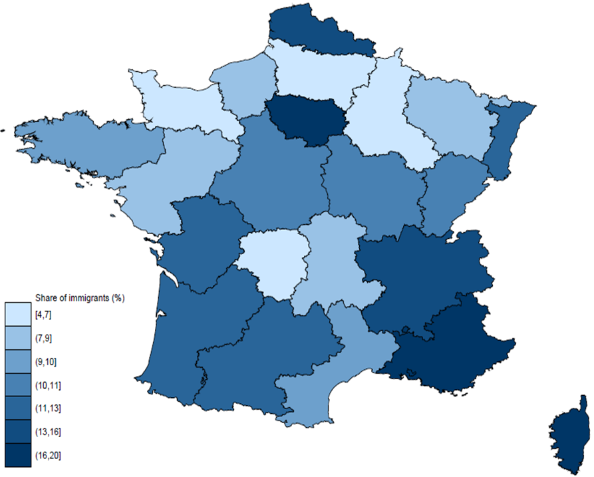Propos recueillis par Isabelle Bensidoun & Jézabel Couppey-Soubeyran
|
- Sur- et sous-évaluations de change en zone euro : vers une correction soutenable des déséquilibres ?
Cécile Couharde, Anne-Laure Delatte, Carl Grekou, Valérie Mignon & Florian Morvillier
- Trade and Labor Market: What Do We Know?
Matthieu Crozet, Gianluca Orefice - Who is Afraid of the Brain Drain? A Development Economist’s View
Hillel Rapoport
- Quels effets un réalignement du taux de change français produirait-il sur les dettes ?
Anne-Laure Delatte, Jérôme Héricourt, Justine Pedrono - Sortie de l’euro et compétitivité française
Michel Aglietta, Anne-Laure Delatte, Etienne Espagne, Carl Grekou, Thomas Grjebine, Jérôme Héricourt, Valérie Mignon, Florian Morvillier, Justine Pedrono, Fabien Tripier - Lex monetae : de quoi parle-t-on ?
Christophe Destais - La Chine devient un grand importateur de biens de consommation, avec l’UE comme principal fournisseur
Françoise Lemoine, Deniz Ünal - Firms outcomes and local migrant workers supply
Cristina Mitaritonna, Gianluca Orefice, Giovanni Peri
- Nutrition transition and the structure of global food demand
Christophe Gouel, Houssein Guimbard - The Role of Fees in Foreign Education: Evidence From Italy and the United Kingdom
Michel Beine, Marco Delogu, Lionel Ragot - The International Elasticity Puzzle Is Worse Than You Think
Lionel Fontagné, Philippe Martin, Gianluca Orefice - Domestic transport costs, Canada, and the Panama Canal
Camilo Umana Dajud - Structure of Income Inequality and Household Leverage: Theory and Cross-Country Evidence
Rémi Bazillier, Jérôme Héricourt, Samuel Ligonnière
Romain Duval sur "Combining structural reforms and fiscal policy"
20 mars 2017
Le CEPII au 5ème Printemps de l'économie: "Faut-il être protectionniste ?"
21 mars 2017
Central Bank Policies and the Debt Trap
28 mars 2017
Politique économique américaine : le grand écart ?
26 avril 2017
3rd MENA Trade Workshop
17 - 18 mai, 2017
Compétitivité, Agriculture et Alimentation - Colloque SFER
22 - 23 juin, 2017
17th Doctoral Meetings in International Trade and International Finance
26 - 27 juin, 2017
- Challenges
Quels projets pour l'Europe de demain? Printemps de l'Economie
Michel Aglietta - Les Echos
Le gouvernement Trump est prêt à prendre le risque d’une sanction à l’OMC
Jean-François Boittin - La Tribune
L'Union européenne doit-elle continuer de signer des accords de libre-échange ?
Jean Fouré - theconversation.com
Conversation avec Jean Fouré : l'Union européenne doit-elle continuer de signer des accords de libre-échange ?
Jean Fouré - Affaires étrangères (France Culture)
Elections aux Pays-Bas, populisme en Europe.
Sébastien Jean - L'Invité des Matins (France Culture)
Géopolitique : avis de tempête en mer de Chine (2ème partie)
Christophe Destais - Xerfi Canal
Abandonner l’euro : possible ? profitable ?
Anne-Laure Delatte - latribune.fr
Le tout renouvelable est-il possible ?
Stéphanie Monjon - theconversation.com
Conversation avec Françoise Lemoine et Andrea Goldstein : peut-on se passer des capitaux chinois ?
Françoise Lemoine - theconversation.com
Conversation avec Christophe Destais : faut-il avoir peur de l'économie chinoise ?
Christophe Destais - theconversation.com
Conversation avec Sophie Piton : la zone euro a-t-elle perdu l'équilibre ?
Sophie Piton - Libération
Euro, réformer ou sortir
Anne-Laure Delatte - L'interview éco (France Info)
L’ombre de Trump va peser sur le G20 à Baden Baden
Lionel Fontagné - latribune.fr
La zone euro a-t-elle perdu l'équilibre ?
Sophie Piton
Quelles conséquences ? Les économistes du CEPII ont exploré le cas où la France quitterait la zone euro dans trois domaines: l'arsenal juridique et administratif, la compétitivité et le système bancaire.  La redénomination en francs des contrats en euros ne pourrait intervenir qu’au terme d’un long processus, serait partielle et entraînerait très probablement la mise en place de mesures de contrôle de capitaux. >>> La redénomination en francs des contrats en euros ne pourrait intervenir qu’au terme d’un long processus, serait partielle et entraînerait très probablement la mise en place de mesures de contrôle de capitaux. >>> En matière de compétitivité, dire qu’un réalignement des parités en zone euro permettrait à la France d’exporter davantage est abusif. >>> En matière de compétitivité, dire qu’un réalignement des parités en zone euro permettrait à la France d’exporter davantage est abusif. >>> Un réalignement du taux de change réel français aurait un effet négatif sur les dettes des banques françaises car celles-ci ont une position nette débitrice en contrat international. >>> Un réalignement du taux de change réel français aurait un effet négatif sur les dettes des banques françaises car celles-ci ont une position nette débitrice en contrat international. >>> |
This is the increase in global food demand for 2050 as projected by CEPII and INRA. The main results of these projections are as follows:  global food demand will increase by 46%, less than half the growth in the previous four decades; global food demand will increase by 46%, less than half the growth in the previous four decades; this growth will be attributable mainly to lower-middle-income and low-income countries; this growth will be attributable mainly to lower-middle-income and low-income countries; the structure of global food demand will change over the period, with a 95% increase in demand for animal-based calories and a much smaller 18% increase in demand for starchy staples; the structure of global food demand will change over the period, with a 95% increase in demand for animal-based calories and a much smaller 18% increase in demand for starchy staples; the analysis of a range of population and income projections reveals important uncertainties: depending on the scenario, the projected increases in demand for animal-based and vegetal-based calories range from 78 to 109% and from 20 to 42%, respectively. the analysis of a range of population and income projections reveals important uncertainties: depending on the scenario, the projected increases in demand for animal-based and vegetal-based calories range from 78 to 109% and from 20 to 42%, respectively.Christophe Gouel & Houssein Guimbard >>> |
What impact of immigrants on firms’ productivity levels? Despite numerous studies exploring how immigration affects local labour markets, there is limited evidence on the impact of immigrants on firms’ productivity levels. Using detailed, firm-level data from France, this column explores how firms react to an increase in the supply of immigrant workers. Cristina Mitaritonna, Gianluca Orefice, Giovanni Peri >>> |
Winners and losers from globalization : who's who? There is a large consensus in the economic literature suggesting the positive impact of globalization on the aggregate well-being of a country. However, a clear-cut conclusion has not been reached on winners and losers from globalization. For this reason, international trade is often accused of increasing wage inequality in both developing and developed countries. Recent CEPII research outputs, based on detailed French firm and worker-level data, confirm that identifying who lost and who gained with globalization is a very difficult task. Matthieu Crozet & Gianluca Orefice >>> |
- Nous contacter
- Nos autres sites
ISSN: 1255-7072
Directeur de publication : Antoine BouëtRédacteur en chef : Dominique Pianelli























